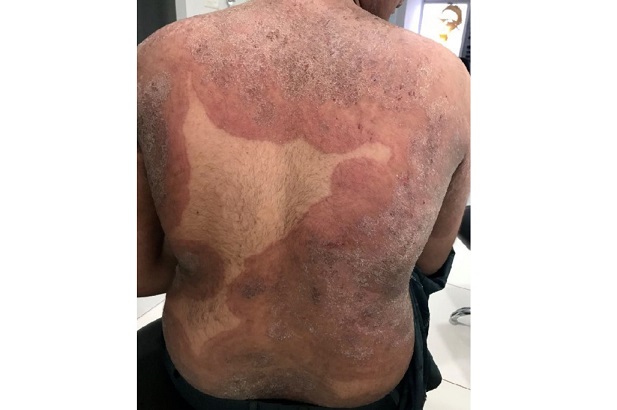Nikhil Prasad Fact checked by:Thailand Medical News Team Nov 25, 2025 2 months, 4 weeks, 1 day, 21 hours, 49 minutes ago
Medical News: Fast Spreading Fungal Skin Infection Alarming Doctors Across Britain
A once rare but now fast spreading drug resistant fungal infection targeting the groin and buttocks is sweeping across the UK, raising fresh concerns among infectious disease experts. The pathogen, known as trichophyton indotineae, has seen an explosive rise of nearly 500 percent in confirmed British cases over the last three years, transforming what was long considered a foreign and isolated medical issue into an emerging public health threat. According to newly presented data at the ESCAIDE conference in Poland, cases climbed from just 44 prior to 2022 to 258 by March 2025, and this
Medical News report highlights why specialists fear the worst if action is not taken.
 Drug resistant super fungus spreading across the UK now poses a growing public health threat.
A Super Fungus That Evades Standard Treatments
Drug resistant super fungus spreading across the UK now poses a growing public health threat.
A Super Fungus That Evades Standard Treatments
Originally identified in India in 2014, T. indotineae is a mutated strain of ringworm renowned for its ability to evade most first line antifungal drugs. Infected individuals experience “angry” red rashes that itch, spread rapidly and cause severe irritation, primarily in the groin, thighs and buttocks. If untreated, the lesions can spread to the face and torso, leading to open sores, secondary infections and long-term scarring.
Doctors across the UK are reporting clusters of infections within households. Towels, bedding, shared clothing and close contact—sexual or otherwise—facilitate rapid spread. Experts like Dr David Denning from the University of Manchester and Professor Darius Armstrong James from Imperial College London warn that many patients are misdiagnosed with eczema or psoriasis, causing weeks of untreated fungal growth. Treatment often requires prolonged courses of itraconazole, a powerful antifungal drug known for potentially toxic side effects on the heart and liver.
An Expanding Global Problem Fuelled by Resistance
Over the past decade, T. indotineae has travelled to more than 20 countries, including Germany and the United States, largely through increased international movement. UK Health Security Agency data shows most British cases currently appear among individuals of South Asian heritage, but experts stress it will not remain confined to specific communities for long. Rising antifungal resistance, seen in other pathogens such as Candidozyma auris, is also contributing to the broader threat. Between 2013 and 2024, England recorded 637 cases of C. auris, including 178 last year alone.
The World Health Organization’s priority list of 19 fungal pathogens underscores the global importance of emerging moulds and yeasts that are becoming increasingly untreatable. With only four classes of antifungal drugs available worldwide and very few under development, the situation is becoming urgent.
What This Growing Threat Means for Public Health
The rapidly rising number of T. indotineae infections signals a deeper vulnerability in global healthcare sys
tems. Misdiagnosis, slow specialist access—often more than 18 weeks in some NHS regions—and increasing resistance mean patients remain infectious far longer than expected. Combined with ease of transmission and the social stigma surrounding skin infections in intimate areas, the condition could spread far more widely in coming years. Urgent investment in faster diagnostics, new antifungal drugs and public awareness is needed to prevent this pathogen from gaining a stronger foothold.
Media References:
https://www.thesun.co.uk/health/37422547/super-fungus-attacks-groin-bum-spreading-uk/
https://www.mirror.co.uk/news/health/drug-resistant-fungus-now-spreading-36300786
For the latest UK Medical News, keep on logging to Thailand
Medical News.
Read Also:
https://www.thailandmedical.news/articles/uk-medical-news
